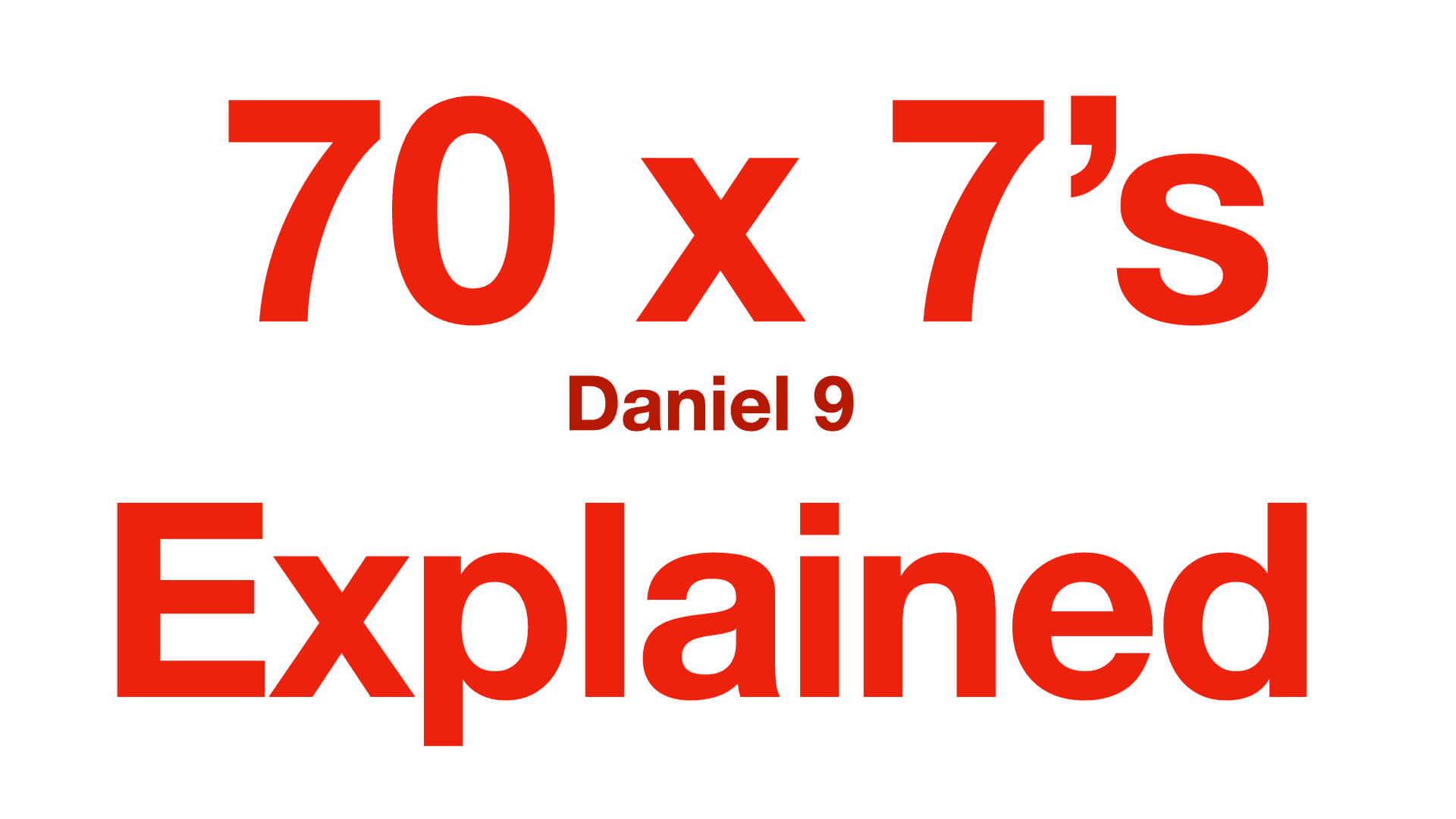For years I never understood why people would talk about the rebuilding of the 3rd temple. It didn’t make any sense. But after studying this text and the various interpretations, I now see why they are advocating for this (even though I disagree with it).
Let’s look at this text. Daniel is praying a prayer of repentance. While he is praying an angel comes and explains the interpretation.
He says some glorious things (please see previous post) and then he gives a time frame indicator. This will happen after “seventy ‘sevens’”.
This has been a key focus unfortunately for many that causes people to miss the point. But that was the last post. So let’s look at this.
There are three main interpretations.
- Literal-future (dispensationalism) – That this will happen in the future with a literal 7 years, that there is a divine pause, and for that to happen there must be a rebuilding of the temple, another desecration of the temple, another end of sacrifices, a treaty that is broken and then Jesus will return.
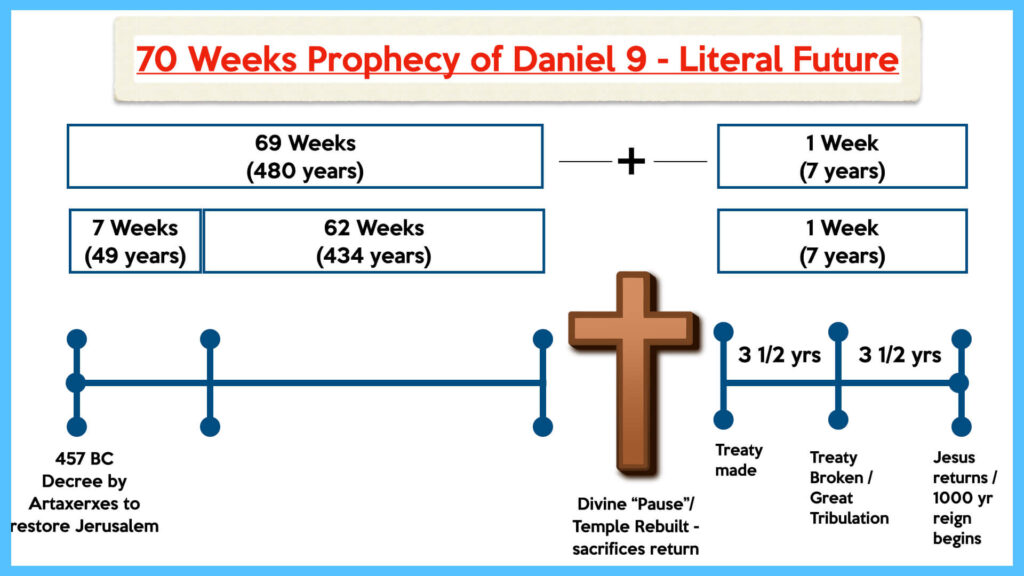
Problems with the Literal View of the 69 weeks and the 70th week
- The original decree to return to rebuild came from Cyrus, not Artaxerxes.
- There is no place in Scripture where there is a gap between the 6th of something in a heptad and the 7th.
- The Sabbath was the 7th day of the week
- The end of debt was the 7th year
- If a gap was permitted, the Jews could say they had a long gap and were wrongly being punished for breaking the Sabbaths which was partly reason for their judgment and exile in Babylon (2 Chr 36:21)
- The 7th of something has always happened consecutively after the 6th of something, without a pause
- The Sabbath was the 7th day of the week
- If the 7 years are still in the future, 1) the temple would have to be rebuilt, 2) a new covenant (yes, the word in Hebrew is covenant) would need to take place, and 3) there would be an abomination in the middle of 7 years.
- The purpose of the temple was fulfilled fully in Christ (Hebrews). There would be no reason for another temple
- There is no better covenant than Jesus or mention of any other covenant beyond the one he established
- We see the abomination that took place through Titus in AD 70
- The temple cannot be rebuilt as the Jews have to have official lineage records for the Aaronic priesthood, and those were destroyed in AD 70
- The purpose of the temple was fulfilled fully in Christ (Hebrews). There would be no reason for another temple
2) The Stephen Interpretation (literal) – That this happened in the first century with the first of the seven being the baptism, the middle being when Jesus was crucified, and the end (the abomination that desolation) being the death of Stephen and the subsequent persecution.
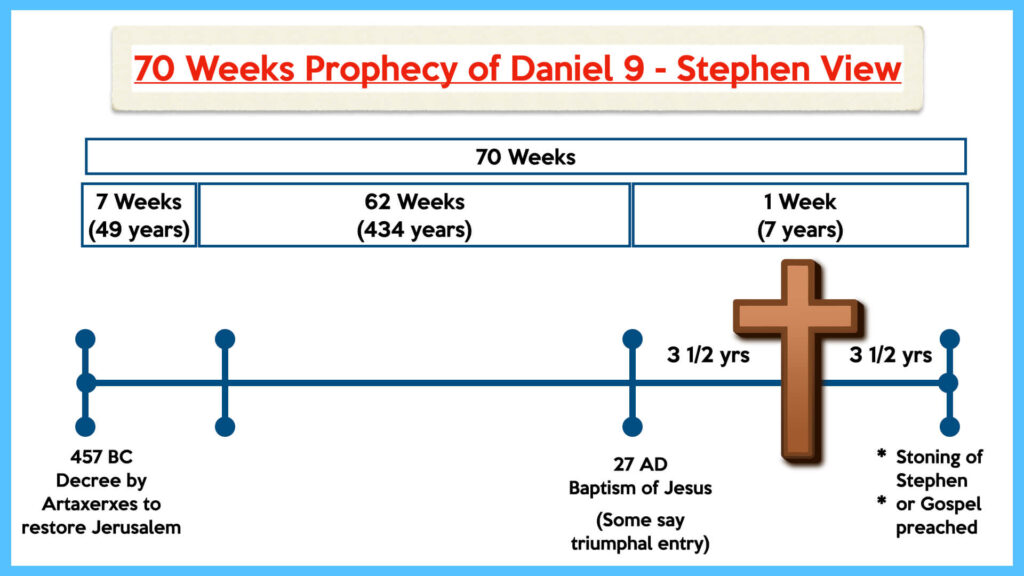
The challenges for the literal 7 years in Jesus’ time, the Stephen View
- For the Stephen view of the 7 literal years being Jesus’ baptism (the beginning), the cross (the middle), and stoning of Stephen (the end of the 70th week)are problematic also.
- The text says the city and temple would be destroyed (9:26) and they were not destroyed between AD 27- AD 34 (the year of Stephen’s stoning)
- While we do see a whole chapter in Acts 7 about the stoning of Stephen and the flight of the persecuted, we don’t see a reference by the later NT writers about his being a prophetic fulfillment. Stephen is only talked about in Acts ch 6-7.
- The text says the city and temple would be destroyed (9:26) and they were not destroyed between AD 27- AD 34 (the year of Stephen’s stoning)
The dates were not concretely affirmed with Jesus’ baptism, the year Jesus died, the stoning of Stephen, etc…
3. The Figurative Interpretation – That this is figurative for sections of time, that the beginning is uncertain but perhaps the birth of Christ (“the anointed one coming”), the death of Christ in the middle (the Messiah “cut off”), and the end of the “7” which is the abomination that causes desolation being the destruction of Jerusalem in AD 70.
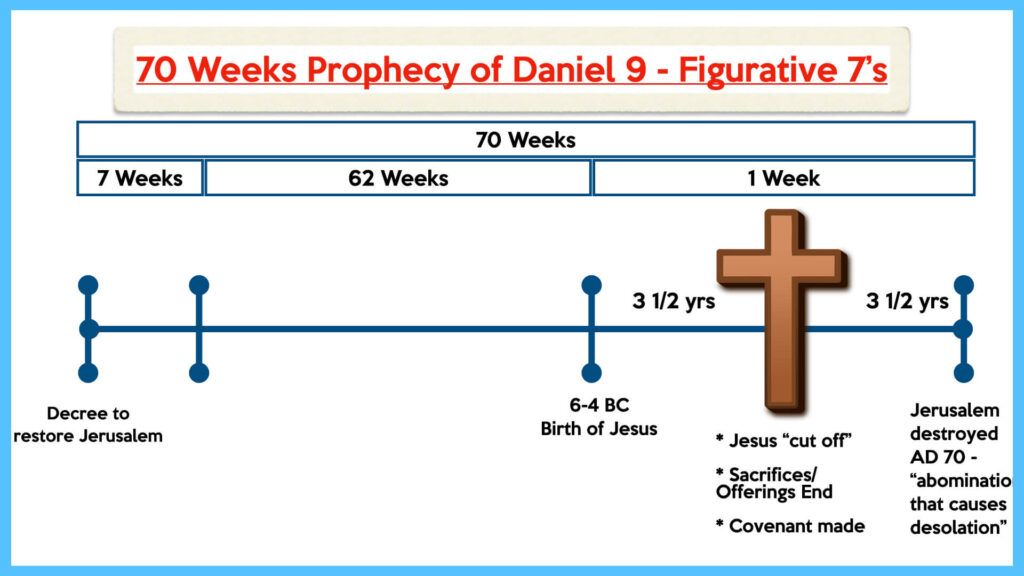
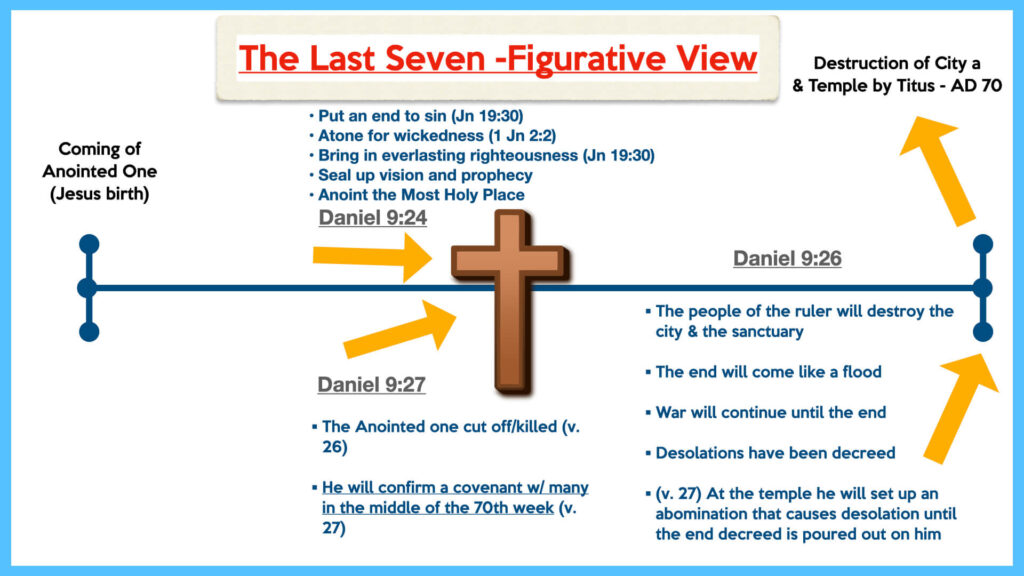
The Handling of Seventy “sevens” in the Bible
- “Seven” is often used as a symbol for completeness.
- When used together of 70’s and 7’s, it on occasion would mean “completely”
- Lamech was to be avenged “seventy-seven times”(Gen 4:24) – this is not the same wording as in Daniel but the nuance is similar
- Jesus told people to forgive “seventy times seven” (Mt 18:22)
- In regards to “time,” it is very possible for the ‘seven’ to be considered a chunk of fullness of time that has been divided up, which we see (7-62-7= 70)
The 7th week with Christ
- It says the 69 weeks end when the Anointed One comes.
- This would be the beginning of the final 70th week
- The Anointed One Comes at Christ’s Birth
- Jesus was born around 6-4 BC roughly
- The gospel writers spent much time on the birth of Christ (Mt, Luke)
- This would be the beginning of the final 70th week
- The “abomination that causes desolation” (v. 27) would then be the end of the 70th week
- At that time the city and the sanctuary would be destroyed (v. 26)
- This fits perfectly with the destruction of Jerusalem by Titus in AD 70
- There was an abomination (a terrible event) that causes desolation (the temple and the city were emptied) because of Titus’ actions
- We see even Jesus grieving over what would happen to Jerusalem and the temple (Lk 19:41-44)
- The “covenant” spoken of, the middle of the 70th week, would be when the new covenant is established at the cross
Further Description of The Cross as the Middle of the 7th Week
- The events described in the middle of the 7th week describe what happened at the cross
- A covenant is confirmed (v. 27)
- He will put an end to sacrifice and offering (v. 27)
- A “covenant” is the word used here,
- A covenant was made with sacrifice, blood and death and not something casual
- The only covenant of the New Testament is the covenant Jesus made at the cross
- The New Covenant is permanent as Jesus never dies (Heb 7:24)
- There is no other coming covenant that could be better than the eternal one that Jesus established
- A covenant was made with sacrifice, blood and death and not something casual
Yes, it speaks of the end, but the “end” in context is not the end/final coming of Christ.
- Scriptures on the end that refer to the cross in Dan 9
- When the 70th week comes he will put an “end” to sin (v. 24)
- He will put an “end” to sacrifice (v. 27)
- In context he is speaking about “the end” of the temple, sacrifices, the old covenant, sin, etc…
It is important to remember what this says about The Anointed One – “Jesus”. He will…
- Put an end to sin (Dan 9:24; Jn 19:30)
- Atone for wickedness (Dan 9:24; 1 Jn 2:2)
- Bring in everlasting righteousness (Dan 9:24; Jn 19:30)
- Seal up vision and prophecy (Dan 9:24; Lk 16:16)
- Anoint the Most Holy Place (Dan 9:24; Heb 9:12)
- Confirm a covenant (Dan 9:27; Mt 26:28)
- He will put an end to sacrifice and offering (Dan 9:27; Heb 9:12)
- This would all take place prior to the destruction of the temple (Dan 9:26-27)

